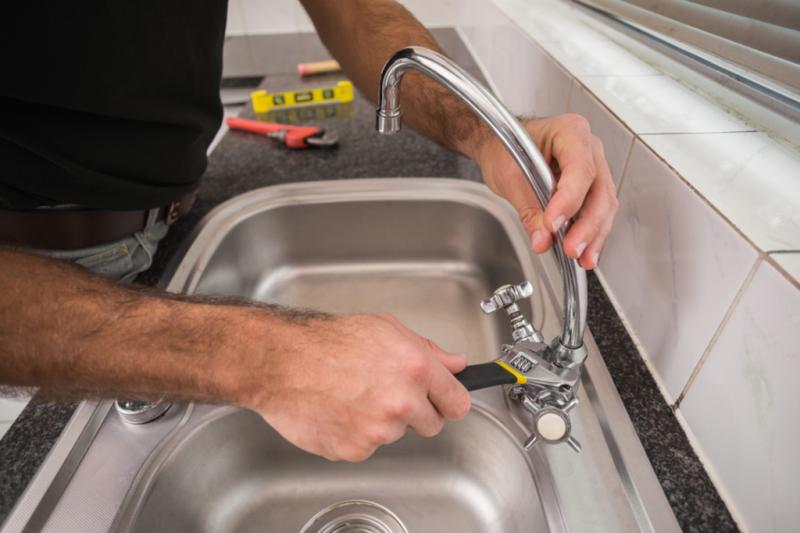Main Reason Why Pipes Are Knocking? (Stop Tips)

Source: wavebreakmedia/Shutterstock.com
Many homeowners know that the jarring sound of knocking pipes can disrupt a peaceful household. While this issue happens nationwide, in the heart of Atlanta, the unique blend of old and new homes creates its own set of plumbing challenges. It's also worth noting that the phenomenon of water pipes knocking isn't just a mild annoyance but can hint at underlying plumbing issues.
Understanding the Phenomenon: Why Do Pipes Knock?
While pipes are designed to transport water silently, a variety of factors can lead to unsettling knocking sounds, whether the water is turned on or off.
Common Causes of Knocking Pipes
- Water pressure issues: Excessive or inconsistent water pressure can be a primary reason behind knocking pipes. When the water's flow rate in the pipe exceeds a certain level, it transitions from a smooth flow to a turbulent one. This turbulence causes water to bounce off the pipe walls, creating that distinctive knocking sound.
- Water hammer: This oddly named phenomenon is another major culprit. It happens due to the sudden cessation or change in water flow and direction, producing a loud hammering noise reminiscent of a hammer strike, hence the name.
- Loose pipes: Just as a loosely strung guitar string reverberates, pipes that aren't securely fastened or anchored can vibrate and knock against adjacent structures, leading to those audible disturbances.
- Loose washers in faucets: Over time, these washers can degrade or become loose, resulting in a knocking noise when water flows past them. The best approach here is a proactive one. Make it a routine to inspect your faucets and replace any washers that seem worn or damaged at the first sign of a leak or noise. Investing in high-quality washers can also pay off in the long run, as they tend to last longer and significantly reduce the chances of knocking.
- Sudden change in water flow and direction: This often happens if a valve is shut off too quickly, leading to knocking sounds. It's essential to operate valves slowly and smoothly to prevent this. If a particular valve is used frequently, consider replacing it with a slow-shut-off valve for better results.
- Air pockets in the lines: When trapped air forms pockets in water lines, it can lead to knocking or tapping sounds as the water tries to navigate its way past. Regularly bleed your system to let out any trapped air to combat this. For a more long-term solution, think about installing air vents or bleed valves, which can help prevent air pockets from forming in the first place.
- Temperature changes: This happens because the pipes either expand or contract based on the water temperature. To counteract this, foam insulation can be wrapped around the pipes, helping to regulate their temperature and reducing the rate at which they expand or contract.
- Faulty valves: A malfunctioning valve can disrupt the water flow, inevitably causing knocking sounds. Periodic inspections are crucial here. Check your plumbing for any valves that seem to be malfunctioning and replace them as needed. This ensures a consistent water flow and helps eliminate any potential knocking sounds.
Troubleshooting Knocking Pipes
Identifying the source of the noise is the first step any homeowner should take. While some issues might be evident immediately, others, especially those deep within walls or floors, require a more methodical approach. In certain cases, especially with older homes in Atlanta, getting professionals involved in a thorough diagnostic process is prudent.
Stop Tips: How to Address and Prevent Knocking Pipes
- Air chambers: These devices act as shock absorbers, mitigating the abrupt water flow changes that result in water hammers. By installing them, homeowners can noticeably reduce the occurrence of water pipes knocking.
- Water pressure regulators: By regulating water pressure, the transition from smooth to turbulent flow is controlled, thus preventing the knocking sound. It's an effective solution, especially for pipes knocking when the water is turned on.
- Pipe fasteners and insulation: Properly fastening and insulating pipes prevent them from vibrating or knocking against other surfaces. For older homes or those undergoing renovations, it’s a critical step to consider.
Special Considerations for Atlanta Homeowners
Atlanta's eclectic mix of housing means plumbing systems widely vary. Historical homes might have older plumbing that's more susceptible to issues. Local homeowners should be vigilant, and given the region's unique challenges, a blend of preventive measures and routine checks becomes vital.
When It's Time to Call in the Professionals
DIY methods, while effective in some instances, won't always suffice. Prolonged knocking of pipes, especially when the water isn’t running, can be a sign of deeper issues, and persistent knocking and movement can damage water supply pipes over time by loosening joints and causing leaks. Delayed or inappropriate interventions might escalate the situation, emphasizing the need for professional expertise.
Conclusion
Knocking pipes, though common, shouldn't be overlooked. Whether it's a minor annoyance of pipes knocking when water is turned on or the more concerning sounds when no water flows, timely actions can prevent larger hassles. Atlanta homeowners should strike a balance between DIY troubleshooting and seeking expert help, ensuring a peaceful home environment free of the disruptive sounds of knocking pipes.
More to Read:
Previous Posts:




